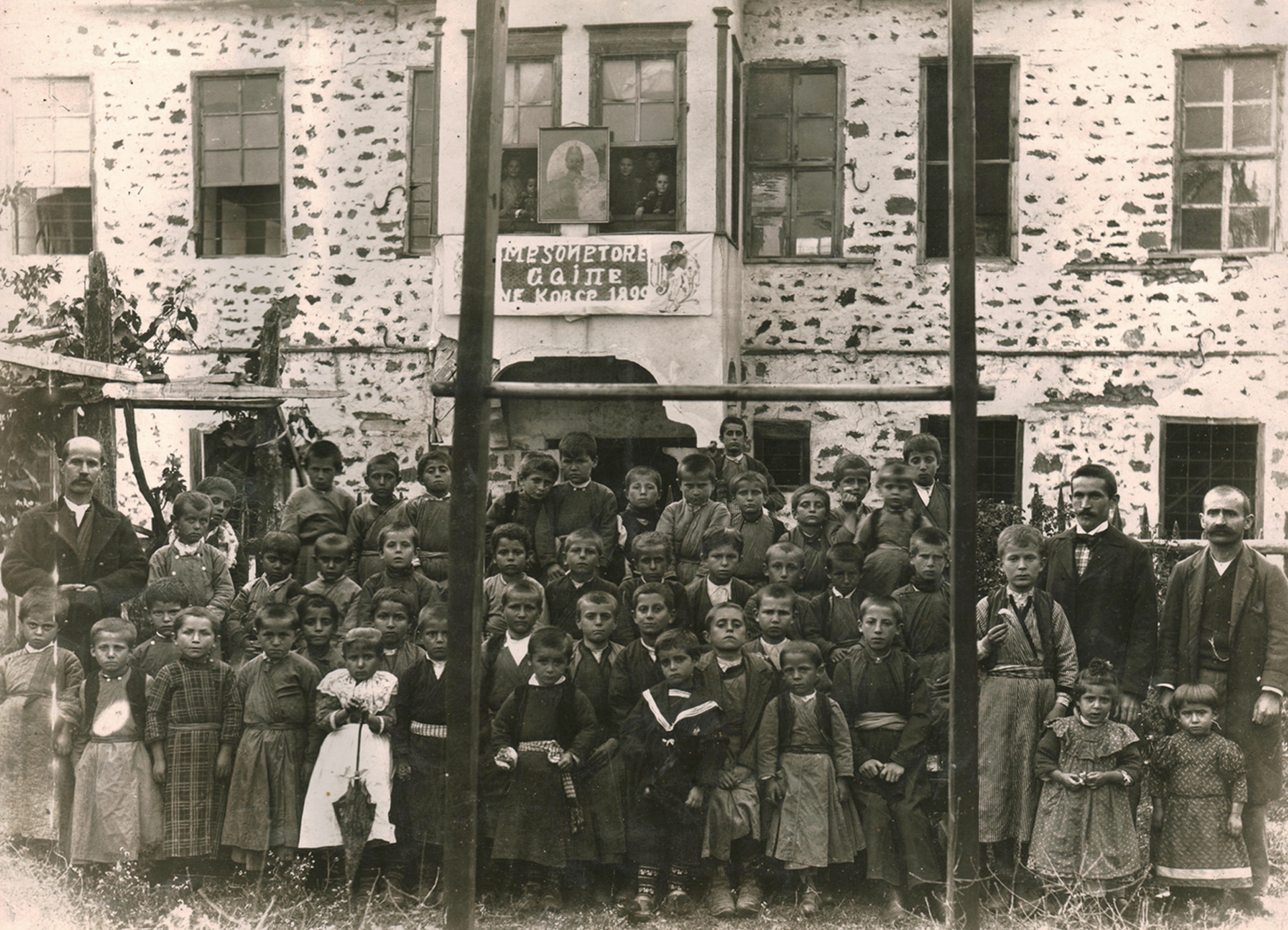|
Qytezë
Qytezë (or Qyteza in its definite form in Albanian) is a community in Korçë County, southern Albania. At the 2015 local government reform it became part of the municipality Devoll. The settlement is known for being the birthplace of Adam Anastas Beloushi, the father of comedian/actor/musicians, John and James Belushi. Qyteza () was formed during the 18th century from the Orthodox settlers of nearby abandoned villages, wrecked from the Ottoman oppression. Local people have contributed to the Albanian National Awakening, June Revolution, and the National Liberation Movement (Albania). Vasil Tromara, an Albanian patriot, is remembered for raising the Albanian flag in Korçë, on November 28, 1920, marking the end of the inter-dependencies of the region and final incorporation in Albania. Migration has always characterized the village; nowadays only a few families are still residing in it. People *Belushi family (see John and James Belushi) *John Papajani, former Washington ... [...More Info...] [...Related Items...] OR: [Wikipedia] [Google] [Baidu] |
Kolë Tromara
Kol Tromara (1882–1945) was an Albanian nationalist and political figure of the first half of the 20th century. Tromara was born in Albanian Orthodox Qytezë, a town in today's Devoll municipality, back then part of the Ottoman Empire, son of Thanas and Kostandina Tromara. Tromara pursued his elementary studies in nearby Korçë, and higher ones in Greece. He started working after then as a pharmacist in Korçë, but due to economical difficulties and political oppression from the Ottomans decided to emigrate in US, quite common at the time for the Orthodox community members. Tromara settled in Boston, Massachusetts in 1906 and was immediately involved in the patriotic circles of the Albanian community there. In 1907, he became secretary of the Besa-Besën society in Boston. In 1915, he became General Secretary of Vatra, the Pan-Albanian Federation of America. A year later, he was elected acting chairman of Vatra; in 1917 he co-founded the "Vatra Musical Band", and organiz ... [...More Info...] [...Related Items...] OR: [Wikipedia] [Google] [Baidu] |
John Belushi
John Adam Belushi ( ; January 24, 1949 – March 5, 1982) was an American comedian, actor, singer and musician. He was one of seven ''Saturday Night Live'' cast members of the first season. He was arguably the most popular member of the ''Saturday Night Live'' ensemble. Belushi had a partnership with Dan Aykroyd. They had first met while at Chicago's the Second City comedy club, remaining together as cast members on the inaugural season of the television show ''Saturday Night Live''. Born in Chicago to Albanian-American parents, Belushi started his own comedy troupe with Tino Insana and Steve Beshekas, called "The West Compass Trio". Bernard Sahlins recruited him for The Second City comedy club. Once there he met Aykroyd, Brian Doyle-Murray, and Harold Ramis. In 1975, Chevy Chase and Michael O'Donoghue recommended Belushi to ''Saturday Night Live'' creator and showrunner Lorne Michaels, who accepted him as a new cast member of the show after an audition. Belushi develope ... [...More Info...] [...Related Items...] OR: [Wikipedia] [Google] [Baidu] |
James Belushi
James Adam Belushi (; born June 15, 1954) is an American actor and comedian. His television roles include ''Saturday Night Live'' (1983–1985), '' According to Jim'' (2001–2009), and '' Good Girls Revolt'' (2015–2016). Belushi appeared in films such as '' Thief'' (1981), '' Trading Places'' (1983), '' The Man with One Red Shoe'' (1985), '' Salvador'' (1986), ''Red Heat'' (1988), '' K-9'' (1989), '' Taking Care of Business'' (1990), '' Destiny Turns on the Radio'' (1995), '' Angel's Dance'' (1999), '' Joe Somebody'' (2001), ''Underdog'' (2007), '' The Ghost Writer'' (2010), '' The Secret Lives of Dorks'' (2013) and '' Wonder Wheel'' (2017). He is the younger brother of late comedy actor John Belushi and the father of actor Robert Belushi. Early life James Adam Belushi was born June 15, 1954, in Wheaton, Illinois, to Adam Anastos Belushi, an Albanian from Qytezë, Korçë, and Agnes Demetri Samaras, who was born in Ohio to ethnic Albanian immigrants from Korçë, south A ... [...More Info...] [...Related Items...] OR: [Wikipedia] [Google] [Baidu] |
Aristotel Samsuri
Aristotel Samsuri was a former Albanian football player who played for Skënderbeu Korçë between 1930 and 1940, where he won the 1933 National Championship and the golden boot in 1931 after scoring 9 league goals. Following his retirement from football, he joined the Albanian Partisans and was captured by the Nazi German troops who put him in a concentration camp in Thessaloniki, Greece where he was executed some time between 1942 and 1944. The ruling post-war Communist regime in Albania covered up his death; the official stance was that he had escaped from the concentration camp and had left Greece on a boat that sank and killed everyone on board except for Samsuri who being the only one to survive the incident, supposedly travelled to the French Upper Volta, modern–day Burkina Faso where he lived under the name Justin Osturno. This was all a lie told to Samsuri's family by the Communist Party, who even wrote fake letters to his family members posing as Samsuri under the ... [...More Info...] [...Related Items...] OR: [Wikipedia] [Google] [Baidu] |
Miras
Miras is a village and a former municipality in the Korçë County, southeastern Albania. At the 2015 local government reform it became a subdivision of the municipality Devoll, Korçë, Devoll. The population at the 2011 census was 6,577.2011 census results The municipal unit consists of the villages Miras, Vidohovë, Arrëz, Çetë, Qytezë, Sinicë, Nikolicë, Menkulas, Ponçarë, Braçanj, Koshnicë, Dobranj, Fitore, Ziçisht, Gjyres and Sul. References [...More Info...] [...Related Items...] OR: [Wikipedia] [Google] [Baidu] |
Devoll, Korçë
Devoll (; sq-definite, Devolli) is a municipality in Korçë County, southeastern Albania. The municipality consists of the administrative units of Hoçisht, Miras, Progër and Qendër Bilisht with Bilisht constituting its seat. As of the Institute of Statistics estimate from the 2011 census, there were 26.716 in Devoll Municipality. It derives its name from the Devoll River flowing through the valley. The border point Kapshticë/Krystallopigi connects Devoll with the Greek regional units of Florina and Kastoria to the east and southeast. Devoll borders the municipalities of Kolonjë to the southwest, Korçë to the west, Maliq to the northwest and Pustec to the north. The area of the municipality is . History Excavations at Tren cave unearthed Mycenaean pottery of the Late Bronze Age. This appears to be of possible local manufacture. The medieval era Devol fortress, then known as Deabolis ( Greek: Δέαβολις), was the location where the Treaty of Devol ... [...More Info...] [...Related Items...] OR: [Wikipedia] [Google] [Baidu] |
Korçë
Korçë (; sq-definite, Korça) is the List of cities and towns in Albania, eighth most populous city of Albania and the seat of Korçë County and Korçë Municipality. The total population of the city is 51,152 and 75,994 of Korçë municipality (2011 census), in a total area of . It stands on a plateau some Above mean sea level, above sea level, surrounded by the Morava Mountains. The area of the Old Bazaar of Korçë, Old Bazaar, including Mirahori Mosque, Korçë, Mirahori Mosque, is considered as the urban core of the city. Founded by the local Ottoman Empire, Ottoman Albanians, Albanian nobleman Iljaz Bej Mirahori, Ilias Bey Mirahori, the urban area of Korçë dates back to the late 15th century and the beginning of the 16th century, however its actual physiognomy was realized in the 19th century, during a period that corresponds with the rapid growth and development of the city. The Old Bazaar has played a dominant role in Albania's market history. Korçë is the larges ... [...More Info...] [...Related Items...] OR: [Wikipedia] [Google] [Baidu] |
Balli Kombëtar
The Balli Kombëtar (literally ''National Front'') was an Albanian nationalist, Collaboration with Nazi Germany and Fascist Italy, collaborationist, and anti-communist resistance movement during the Second World War. It was led by Ali Këlcyra and by Mid'hat Frashëri, Midhat Frashëri. The movement was formed by members from the landowning elite, liberal nationalists opposed to communism, and other sectors of society in Albania.... The motto of the Balli Kombëtar was: ' (Albania to the Albanians, Death to the Traitors). Eventually, the Balli Kombëtar joined the Nazi Germany-established puppet government as part of the German occupation of Albania and fought as an ally against communist guerrilla groups. The Balli Kombëtar engaged in significant acts of terror culminating in atrocities committed against Serb and Greek civilians. History Although Këlcyra and Frashëri had initiated opposition actions against the Italian authorities almost from the beginning of Italian protec ... [...More Info...] [...Related Items...] OR: [Wikipedia] [Google] [Baidu] |
Vatra, The Pan-Albanian Federation Of America
Vatra (') is an association of Albanian Americans, created in 1912, that has historically protected the rights of the Albanians in the United States, as well as has endeavored in lobbying with the United States Congress about the rights of the Albanians throughout the world. Foundation The first meeting to bring together all the Albanian American organizations into one federation took place on December 24, 1911, in Boston. This meeting was called with the initiative of the "Besa-Besën" association. In these meetings were present: Faik Konica, Fan Noli, Kristo Floqi, Marko Adams, and Paskal Aleksi. The meetings continued until 28 April 1912, when Vatra was officially founded. The official records of the unity commission cites: "We call as formed the Pan Albanian Federation of America by the following associations: "Besa-Besë", "Flamuri i Krujës-Kruja Flag", "Shoqërisë Kombëtare-National Association", "Mirëbërësja", and "Skënderbeut". "Dallandyshja" and "Malli i Mëmëdheut ... [...More Info...] [...Related Items...] OR: [Wikipedia] [Google] [Baidu] |
Washington State Senate
The Washington State Senate is the upper house of the Washington State Legislature. The body consists of 49 members, each representing a district with a population of nearly 160,000. The State Senate meets at the Washington State Capitol, Legislative Building in Olympia, Washington, Olympia. As with the lower house, lower Washington House of Representatives, House of Representatives, state senators serve without term limits, though senators serve four-year terms. Senators are elected from the same legislative districts as House members, with each district electing one senator and two representatives. Terms are staggered so that half the Senate is up for reelection every two years. Like other upper houses of State legislature (United States), state and territorial legislatures and the federal U.S. Senate, the state senate can confirm or reject Governor of Washington, gubernatorial appointments to the state cabinet, commissions and boards. Leadership The Constitution of Washingt ... [...More Info...] [...Related Items...] OR: [Wikipedia] [Google] [Baidu] |
June Revolution
The June Revolution () was a popular uprising in Albania that temporarily overthrew the Zogist regime following the 1923 Albanian parliamentary election and the assassination of popular Albanian activist and politician Avni Rustemi. A new government was established under Fan Noli that sought to implement a series of radical and liberal reforms, much to the dismay of Albania's traditional landowning class, and Ahmet Zogu would return to power after staging a counter-coup six months later with the help of the Kingdom of Yugoslavia. Background Zog's Rise to Power Albanian chieftain and politician Ahmet Zogu, or simply 'Zog', who would come to establish an authoritarian regime over Albania, had become increasingly involved in the Albanian political scene since after the establishment of Independent Albania in 1912. An opportunist with a lack of concern for political scruples, Zog fought both for and against the Turks, the Austro-Hungarians, Prince William of Wied, Essad Pash ... [...More Info...] [...Related Items...] OR: [Wikipedia] [Google] [Baidu] |




